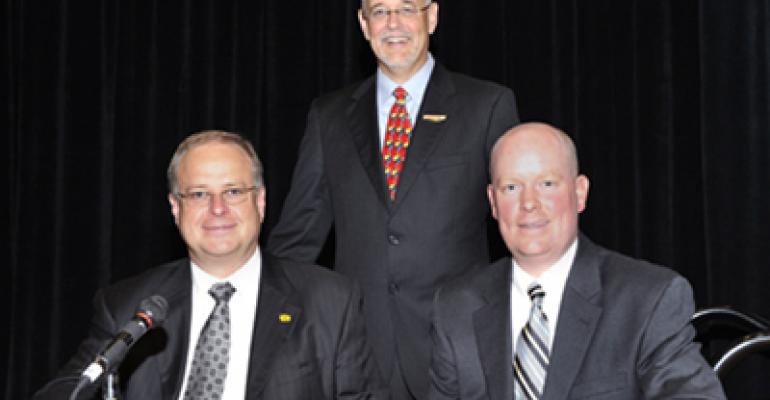The Malcolm Baldrige National Quality Award, which is intended to improve the competitiveness and performance of U.S. organizations, has only been given to two restaurant companies in its 23-year history. Executives from those winning restaurant companies shared key takeaways from the experience at NRN’s recent MUFSO conference.
Thom Crosby, chief executive of Pal’s Sudden Service of Kingsport, Tenn., and Marlis Oliver, executive director of K&N Management of Austin, Texas, both stressed the importance of clear communication, frequent assessments and employee engagement during a panel presentation on “Operational Excellence.” Don Fox, chief executive of Firehouse Subs franchisor Firehouse of America, was the moderator.
Pal’s Sudden Service, a 23-unit quick-service chain with average unit volumes of $1.8 million, in 2001 became the first restaurant company to win the Baldrige award, which has been bestowed on a handful of companies annually since 1988. K&N Management of Austin, Texas, operator of four licensed Rudy’s Country Store & Bar-B-Q restaurants and four Mighty Fine Burgers, Fries and Shakes locations, picked up the award earlier this year.
Both Crosby and Oliver said companies should create a culture of excellence through high expectations, backed up with open communication and frequent measurement. Oliver said an atmosphere of overachieving and “over-communication” has built a sense of pride among K&N employees that is critical to the company’s success.
“They know they are in an atmosphere where excellence is expected,” he said.
Continued from page 1
Taking the long view
Crosby said Pal’s Sudden Service gauges success through a variety of metrics, including peer review scores, employee turnover rates and guest satisfaction marks, Crosby said.
“We only chase quality sales,” Crosby said, and added Pal’s never discounts and strives to treat customers in a way that “creates passionate loyalty.”
Pal’s annually trims its number of data reports, as it better understands the information it truly needs to improve performance, Crosby said. While many companies focus on weekly-sales reports, he said Pal’s management pays more attention to “1-data point” swings in key metrics.
Because Pal’s calculates the potential lifetime value of a customer to be $28,000 and does not look at single transactions as win-or-lose encounters, Crosby said the chain trains each employee to be a “customer advocate.”
Engaging employees
Pal’s also urges employees to get involved in the pursuit of operational excellence. Of employees who shut down production because they spot a problem, rather than pass the problem to a co-worker or the customer, he said, “We make heroes out of them.”
“We don’t mind mistakes,” Crosby said, “but we don’t tolerate repeated mistakes.”
Crosby said all 900 Pal’s employees understand the enterprise’s strategic plan and their part in it, and are engaged in return on investment.
Becoming a Pal’s general manager is a four-year process with such requirements as reading and reporting on 40 books and keeping a journal, Crosby said. The chain wants “highly trained and disciplined superstars” managing its restaurants, he indicated, because of its very lean corporate staffing structure.
K&N Management’s Oliver said at his company, new employees spend half of their first day in the restaurant with the general manager because “we’re looking for an emotional connection.”
Continued from page 2
Whenever there is a change in a system, process or procedure it is written up and sent to the restaurants where it is tacked to a cork board and made a topic of discussion during crew meetings each day for a week, Oliver said.
“This form is simple, but it has done wonders for us,” he said.
K&N Management keeps coaching charts and believes that repetition creates sustainable behavior, Oliver said.
Measuring progress
Audits and measurement by internal and external personnel are an important part of the performance culture, he said, as exemplified by K&N’s “game film” program.
Through that initiative a mystery shopper using a hidden video camera records his or her experience during a weekly visit to each restaurant. The footage is not used for disciplinary purposes, but rather, as an educational tool, he said.
Oliver said K&N personnel have made 13 trips to visit Pal’s Sudden Service locations or that chain’s affiliated Business Excellence Institute for sharing best practices. He acknowledged that the Baldrige award and performance improvement process “truly was a roadmap to our success.”
Voted into existence by Congress in 1987, the Baldrige Performance Excellence Program and associated award are managed by the U.S. Department of Commerce’s National Institute of Standards and Technology.
Contact Alan J. Liddle at [email protected].
Follow him on Twitter: @AJ_NRN




